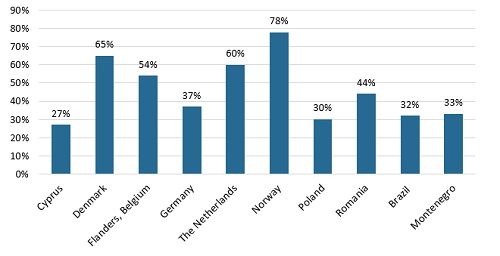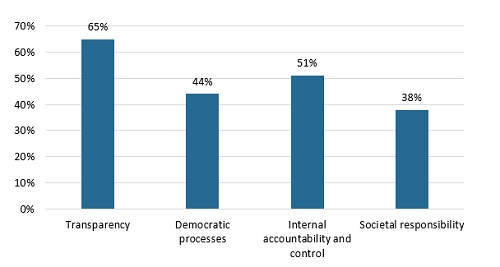New study reveals big gaps in governance across sports in Europe
With accelerating speed, the issue of good governance has climbed to the top of the sports political agenda over the past few years. Not only have corruption and crime cases involving international sports federations drawn worldwide attention. There is also a growing awareness that the failures of sports governance on a national and international level are systemic and undermine the legitimacy of sport.
Up until recently, focus has mostly been on governance in international sports federations, but a new and in many ways groundbreaking study examines the governance standards in eight or more sports in nine European countries plus Brazil.
The study has been carried out by academic researchers in all countries as part of the project ‘National Sports Governance Observer (NSGO)’, led by Arnout Geeraert from KU Leuven and Utrecht University and coordinated by Play the Game (see details in box below).
The mapping is done by using 274 individual indicators within four governance dimensions: Transparency, democratic processes, internal accountability and control, and societal responsibility.
The findings demonstrate that the degree of good governance in sports federations varies considerably across the ten countries (see figure 1).
Figure 1: Overall NSGO index scores – all countries

The average score of the NSGO country indexes of the nine European countries is 47%, which corresponds to a ‘moderate’ scoring label. Sports federations in Norway, Denmark, and the Netherlands mostly achieve ‘good’ to ‘very good’ scores. Flemish federations generally achieve average to good scores. The federations in the other countries achieve mostly average to ‘weak’ scores.
Achieving a low score does not automatically render a federation ineffective, illegitimate, or unethical. However, the weaker the score, the more vulnerable the federation, and Jens Sejer Andersen, international director of Play the Game, sees plenty of room for improvement:
“Sports leaders could do much more to secure transparency on financial issues and remuneration. They are reluctant to limit the time they stay in powerful positions, and conflicts of interest are largely ignored. There is little care for gender balance, and athletes are rarely consulted in any systematic way,” Andersen points out.
Concrete governance challenges
Transparency is the dimension in which the nine European countries achieve the best average score namely 65% (good). It is followed by the democracy and accountability dimensions at 44% and 51%, respectively (moderate). The average NSGO score on the societal responsibility dimension is 38%, which corresponds to a ‘weak’ scoring label.
Figure 2: Average scores of the surveyed European countries and Brazil on the NSGO dimensions

Societal responsibility is an area a large majority of the federations struggle with. Most have their anti-doping policies in place (64%), but under-achieve with regard to environmental sustainability (19%), athletes’ rights (29%), gender equality (24%), anti-match-fixing (34%), and dual career policies (34%).
Among other concrete challenges are:
- Even if transparency is the area where the federations perform best with a 65% average score, there is a large room for improvement. Less than a third of the national federations publish information on the remuneration of board members and top executives. And a very big minority (43%) does not publish an annual financial report on their website.
- Conflicts of interest are largely neglected: Only 11% of the surveyed federations publish an (anonymised) overview on the declarations of conflicts of interest and the decisions in which conflicts of interest were involved. No more than 24% of the federations have conflict of interest rules that ensure that particular conflicts must be submitted to the general assembly.
- Elections are generally held in accordance with well-defined procedures, but very few have policies to achieve a differentiated composition of the board (24%), term limits (31%), the involvement of athletes in policy processes (30%), and a gender equality policy (23%).
- Whistleblowers enjoy very little protection in national federations even if in recent years they have been key to exposing scandals at the national and international level. Only 17% of the federations formally ensure that no person who reports a concern shall be subject to negative consequences.
- Less than half of the federations have formulated objectives and actions aimed at mitigating the health risks of sporting activities. And just 15% have conducted an analysis of the specific health risks associated with their sport.
Shift in attitudes
Despite the significant challenges in many national sports federations, Jens Sejer Andersen senses a shift in sports organisations’ attitudes towards reform:
“Only a few years ago, sports leaders would typically sit with their arms folded when governance was on the agenda. It has been very encouraging to experience first-hand that many national leaders now engage strongly and positively, looking for opportunities to improve their organisations,” he says.
Jens Sejer Andersen stresses that the 265 pages report does not pretend to give a full picture of the reality of sports organisations. The impact of rules and regulations depends at the end of the day on the human beings that administer them.
But according to Andersen, the NSGO raises a lot of political perspectives and specific information needed by those who wish to set the course for sport, and despite the fact that the EU support expires by the end of the year, Play the Game plans to continue and expand the use of the National Sports Governance Observer tool.
Play the Game is currently in the process of including Australia, Canada, Colombia, Georgia, Lithuania, Peru, and the USA and invites interested parties from other countries to join the project as official partners.







Jens, I was wondering if ICSSPE could somehow be of assistance in this project. Please let me know, and I will speak with Detlef about it. Many thanks. Darlene